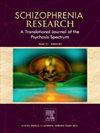Socially relevant affective learning in psychosis: Relations to deficits in motivation and pleasure and cognitive ability
IF 3.6
2区 医学
Q1 PSYCHIATRY
引用次数: 0
Abstract
Negative symptoms are common in psychotic disorders and significantly contribute to functional impairment. Deficits in reward processing and memory have been implicated as important factors which contribute to negative symptoms, leading to speculation that deficits in learning and memory of socially relevant information may be particularly important. Previous work has also found poorer learning of positive social behavior associations in psychotic disorders, but limitations have prevented an examination of symptom correlates of this diminished learning. In the present study, we used an updated social affective learning task to examine whether diminished accuracy in learning the affective value of others was related to motivation and pleasure negative symptoms as well as cognitive deficits. Results indicated that participants were able to use both positive and negative behavioral information to generate accurate socially evaluative perceptions. Results also demonstrated that reduced accuracy of learning from positive behavioral information was related to greater motivation and pleasure symptoms and cognitive deficits, including working memory, while reduced accuracy of learning from negative behavioral information was only related to cognitive deficits across multiple domains. When controlling for cognition, motivation and pleasure symptoms were no longer related to positive affective learning, but working memory remained related to learning when controlling for motivation and pleasure symptoms. These findings underscore the role of diminished positive affective learning in negative symptoms and suggest that poorer learning of the positive value of others may be one pathway through which cognitive deficits lead to reduced reward anticipation, defeatist performance beliefs, and negative symptoms.
精神病患者的社会相关情感学习:与动机、愉悦和认知能力缺陷的关系
阴性症状在精神障碍中很常见,并显著导致功能障碍。奖励处理和记忆的缺陷被认为是导致消极症状的重要因素,导致人们猜测,学习和记忆社会相关信息的缺陷可能特别重要。先前的研究也发现,精神疾病患者对积极社会行为关联的学习能力较差,但局限性阻碍了对这种学习能力下降的症状相关性的研究。在本研究中,我们使用了一个更新的社会情感学习任务来检验学习他人情感价值的准确性降低是否与动机和愉悦负面症状以及认知缺陷有关。结果表明,参与者能够使用积极和消极的行为信息来产生准确的社会评价感知。结果还表明,从积极行为信息中学习的准确性降低与更大的动机和愉悦症状以及包括工作记忆在内的认知缺陷有关,而从消极行为信息中学习的准确性降低仅与跨多个领域的认知缺陷有关。在控制认知时,动机和愉悦症状不再与积极情感学习相关,但在控制动机和愉悦症状时,工作记忆仍与学习相关。这些发现强调了积极情感学习在消极症状中的作用,并表明对他人积极价值的学习能力较差可能是认知缺陷导致奖励预期减少、失败主义表现信念和消极症状的一个途径。
本文章由计算机程序翻译,如有差异,请以英文原文为准。
求助全文
约1分钟内获得全文
求助全文
来源期刊

Schizophrenia Research
医学-精神病学
CiteScore
7.50
自引率
8.90%
发文量
429
审稿时长
10.2 weeks
期刊介绍:
As official journal of the Schizophrenia International Research Society (SIRS) Schizophrenia Research is THE journal of choice for international researchers and clinicians to share their work with the global schizophrenia research community. More than 6000 institutes have online or print (or both) access to this journal - the largest specialist journal in the field, with the largest readership!
Schizophrenia Research''s time to first decision is as fast as 6 weeks and its publishing speed is as fast as 4 weeks until online publication (corrected proof/Article in Press) after acceptance and 14 weeks from acceptance until publication in a printed issue.
The journal publishes novel papers that really contribute to understanding the biology and treatment of schizophrenic disorders; Schizophrenia Research brings together biological, clinical and psychological research in order to stimulate the synthesis of findings from all disciplines involved in improving patient outcomes in schizophrenia.
 求助内容:
求助内容: 应助结果提醒方式:
应助结果提醒方式:


